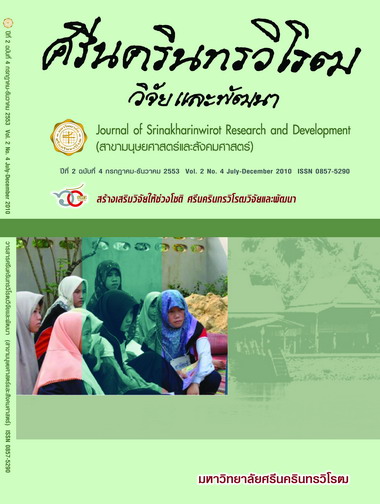การศึกษากลวิธีการเรียนรู้ภาษาอังกฤษของนักเรียนมัธยมศึกษาปีที่ 6 ของโรงเรียนที่มีคะแนน O-NET สูงสุด 10 อันดับแรก (A STUDY OF ENGLISH LEARNING STRATEGIES USED BY MATTHAYOMSUKSA 6 STUDENTS OF THE TOP TEN O-NET SCORING SCHOOLS)
Keywords:
English Learning Strategies, O-NET Top Ten O-NET SchoolAbstract
บทคัดย่อการวิจัยครั้งนี้มีวัตถุประสงค์เพื่อศึกษากลวิธีการเรียนรู้ภาษาอังกฤษของนักเรียนมัธยมศึกษาปีที่ 6 ของโรงเรียนที่มีคะแนน O-NET สูงสุด 10 อันดับแรก 3 ปีอย่างต่อเนื่องตั้งแต่ปี พ.ศ. 2548-2550 และเป็นโรงเรียนที่เปิดสอนแผนการเรียนทั้งสาม คือ แผนการเรียน วิทย์คณิต ศิลป์ภาษาและ ศิลป์คำนวณ จำนวน 5 โรงเรียน กลุ่มตัวอย่างเป็นนักเรียนจำนวน 333 คน ซึ่งเรียนแผนวิทย์คณิตจำนวน 111 คน ศิลป์ภาษาจำนวน 111 คน และศิลป์คำนวณจำนวน 111 คน โดยแบ่งนักเรียนในแต่ละแผนออกเป็น 3 กลุ่มตามผลการเรียนวิชาภาษาอังกฤษ กลุ่มที่มีการเรียนระดับดีมาก ดี และพอใช้ เครื่องมือที่ใช้ในการวิจัย ได้แก่ แบบสอบถาม และแบบบันทึกการสัมภาษณ์ครูและนักเรียน
ผลการวิจัยพบว่า
1. กลวิธีการเรียนรู้ภาษาอังกฤษที่มีการใช้มากที่สุด คือ กลวิธีการชดเชยข้อบกพร่อง ตามด้วยกลวิธีด้านปัญญา กลวิธีด้านสังคม กลวิธีด้านอภิปัญญา กลวิธีด้านอารมณ์ และกลวิธีด้านการจดจำ
2. นักเรียนที่มีผลการเรียนภาษาอังกฤษดีมากใช้กลวิธีด้านปัญญาและกลวิธีด้านอภิปัญญามากที่สุด ส่วนนักเรียนที่มีผลการเรียนภาษาอังกฤษดีและพอใช้ ใช้กลวิธีการชดเชยข้อบกพร่องมากที่สุด และนักเรียนทุกระดับผลใช้กลวิธีด้านการจดจำน้อยที่สุด
3. การใช้กลวิธีการเรียนรู้ภาษาอังกฤษไม่มีความสัมพันธ์กับแผนการเรียนของนักเรียน โดยนักเรียนในทุกแผนมีการใช้กลวิธีการเรียนรู้ภาษาอังกฤษไม่แตกต่างกัน แต่พบว่าการใช้กลวิธีการเรียนรู้ภาษาอังกฤษมีความสัมพันธ์กับระดับผลการเรียนภาษาอังกฤษ กล่าวคือนักเรียนที่มีผลการเรียนภาษาอังกฤษในระดับสูงกว่ามีการใช้กลวิธีการเรียนรู้ภาษาอังกฤษมากกว่านักเรียนที่มีผลการเรียนภาษาอังกฤษในระดับต่ำกว่า
4. นักเรียนที่มีผลการเรียนภาษาอังกฤษในระดับดีมากมีศักยภาพในการประยุกต์ใช้กลวิธีด้านอภิปัญญาได้มากกว่านักเรียนที่มีผลการเรียนภาษาอังกฤษในระดับดีและพอใช้ นักเรียนที่มีผลการเรียนภาษาอังกฤษในระดับดีมากให้ความใส่ใจทั้งขั้นตอนการเรียนรู้และผลจากการเรียนรู้ ในขณะที่นักเรียนที่มีผลการเรียนภาษาอังกฤษในระดับดีให้ความใส่ใจเฉพาะขั้นตอนการเรียนรู้ ส่วนนักเรียนที่มีผลการเรียนภาษาอังกฤษในระดับพอใช้ให้ความใส่ใจผลของการเรียนรู้เท่านั้น นอกจากนี้ยังพบว่า นักเรียนที่มีผลการเรียนภาษาอังกฤษในระดับดีมากมีลักษณะการเรียนรู้แบบด้วยตนเอง ในขณะที่นักเรียนที่มีผลการเรียนภาษาอังกฤษในระดับดีและพอใช้มีลักษณะการเรียนรู้แบบพึ่งผู้อื่น
Abstract
This study aimed to identify English learning strategies used by Thai Matthayomsuksa 6 (12th grade) students of five top-ten English subject’s O-NET (Ordinary National Educational Test) scoring schools in the three consecutive academic years of 2005-2007, which offered three academic programs: Science, Arts and Arts-Math. The participants were 333 students selected according to their academic programs and English proficiency levels: very high (VH), high (H) and moderate (M). The research instruments were a questionnaire and interviews.
The results revealed that:
1. The most-used English learning strategies used were compensation strategies, followed by cognitive strategies, social strategies, metacognitive strategies, affective strategies, and memorization strategies respectively.
2. The most-used strategies of the VH proficiency students were cognitive strategies and metacognitive strategies, whereas the ones shared by the H and the M proficiency students were compensation strategies. All three different proficiency students employed memorization strategies as the least-used ones.
3. English learning strategy use was found not significantly correlated to students’ academic programs; there was no different in strategy use among students in the three academic programs. However, it was found significantly correlated to the English proficiency levels; the higher proficiency students used more strategies than the lower proficiency students.
4. The VH proficiency students showed a greater potential ability than the other groups in applying metacognitive strategies. The VH proficiency students focus on both learning process and product, whereas the H and the M proficiency students concentrated only on learning process and product respectively. The VH proficiency students also employed the characteristics of self-learning while the H and the M proficiency students relied on others.
Downloads
Downloads
Published
How to Cite
Issue
Section
License
Srinakharinwirot Research and Development Journal of Humanities and Social Sciences is licensed Under a Creative Commons Attribution-NonCommercial-NoDerivs 4.0 International (CC-BY-NC-ND 4.0) License, Unless Otherwise Stated. Please Read Journal Policies Page for More Information on Open Access, Copyright and Permissions.



